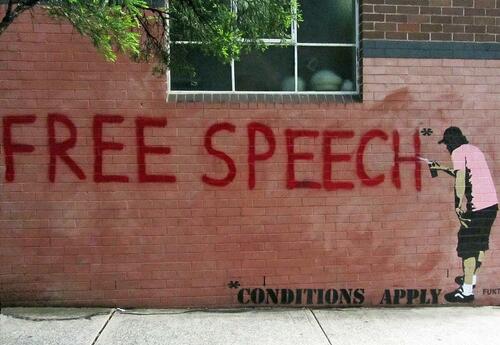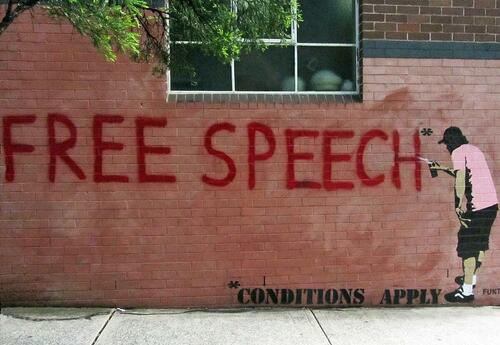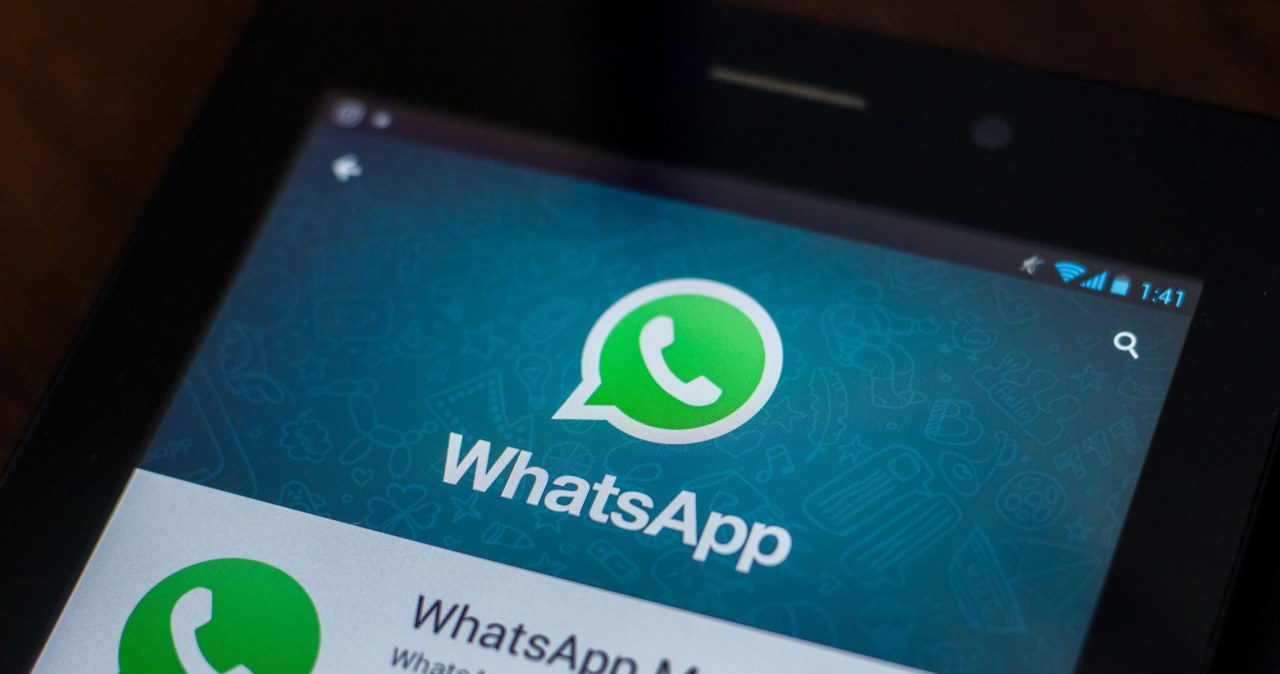

Democrats Cry Foul As Anti-Free Speech Allies Turn Against Them
Authored by Jonathan Turley,
Below is my column in The Hill on the recent disruptions of events featuring leading Democrats from President Joe Biden to Rep. Jamie Raskin. After years of supporting the censoring and blacklisting of others, these politicians are now being targeted by the very anti-free speech movement that they once fostered. Hillary Clinton last week became the latest Democrat targeted by protesters in a visit to her alma mater, Wellesley College.

Here is the column:
You are “killing people,” President Biden told social media companies a couple of years ago. He sought to shame executives into censoring more Americans. Biden has lashed out at disinformation by anti-vaxxers, “election deniers” and others. This month, those words were thrown back at Biden himself as a “genocide denier” by protesters who have labeled him “Genocide Joe” over his support for Israel.
After years of supporting censorship and blacklisting of people with opposing views, politicians and academics are finding themselves the subjects of the very anti-free speech tactics that they helped foster.
Rep. Jamie Raskin (D-Md.), for example, has been a leading figure in Congress opposing efforts to curtail massive censorship programs coordinated by the Biden administration. While opposing the investigation into past federal censorship efforts, Raskin continues to push social media companies to increase the censorship and silencing of Americans. Last December, Raskin sent a letter on behalf of other Democrats on the powerful House Oversight Committee demanding even more censorship, not only on election fraud, COVID or climate change, but also on abortion.
“We are troubled by the rapid spread of abortion misinformation and disinformation on your company’s social media platform,” he wrote, “and the threat this development poses to safe abortion access in the United States.”
When journalists and even other members testified in favor of free speech, Democrats attacked them as “Putin lovers” and fellow travelers supporting “insurrectionists.”
Last week, however, the left turned on Raskin.
He was giving a lecture titled “Democracy, Autocracy and the Threat to Reason in the 21st Century.” According to the Maryland Reporter, the protesters accused Raskin of being “complicit in genocide.” After efforts to resume his remarks, University of Maryland President Darryll Pines finally ended the event early.
Pines then pulled a Raskin. While mildly criticizing the students for their lack of “civility,” he defended their disruption of Raskin’s remarks as if a heckler’s veto were free speech. “What you saw play out actually was democracy and free speech and academic freedom,” he said. “From our perspective as a university, these are the difficult conversations that we should be having.”
There was, of course, no real conversation because this was not the exercise but the denial of free speech. The protesters were engaging in “deplatforming,” which is common on our campuses, where students and faculty organize to prevent others from hearing opposing views.
So, after years of Raskin encouraging the censorship of others, the mob finally came for him. The yawning response of the university was not unlike his own past response to journalists, professors and dissents who have come before his committee.
The only “difficult” aspect of this conversation is for university figures like Pines who are called upon to defend the free speech rights of speakers or faculty. They need to show the courage and principle required to uphold the free speech commitment of higher education, even at the risk of being targeted themselves. That includes the sanctioning of students who prevent others from hearing opposing views in classrooms and event forums. These students have every right to protest outside such spaces, but higher education is premised on the free exchange of ideas. There is really no further “conversation” needed, just a letter of suspension or expulsion for those who deprive others of their rights.
Deplatforming is the rage on our campuses. Universities often use it to cancel events for conservatives or controversial speakers. Often officials will sit idly by, refusing to remove protesters or deter disruptions. And that can lead to self-help measures by others.
Last week, Walter Isaacson, former CEO of CNN and the Aspen Institute, was accused of assaulting a Tulane student protester, Rory MacDonald, during an event held off campus. Isaacson, 72, who teaches at Tulane, was attending the university-sponsored event and had had enough when MacDonald became the eighth protester to stop the event. He stood up and shoved MacDonald into the hall.
MacDonald insisted that he and his fellow protesters were merely “peacefully interrupting” the event to stop others from speaking. He displayed slight scratch marks and is quoted as expressing a fear of returning to campus after the incident. Protests have been held on campus to have Isaacson fired.
I have long criticized the growing anti-free speech movement in higher education. Yet these students have been taught for years that “speech is violence” and harmful. They have also been told by figures such as Pines that silencing others is an act of free speech. Academics and deans have said that there is no free speech protection for offensive or “disingenuous” speech. In one instance, former CUNY Law Dean Mary Lu Bilek insisted that disrupting a speech on free speech is itself free speech.
Even schools that purportedly forbid such interruptions rarely punish students who engage in them. For example, students disrupted a Northwestern class due to a guest speaker from Immigration and Customs Enforcement (after the class had heard from an undocumented immigrant). The university let the protesters into the room after they promised not to disrupt the class. They proceeded to stop the class and then gave interviews to the media proudly disclosing their names and celebrating the cancellation. Northwestern did nothing beyond express “disappointment.”
At Stanford, law students prevented a federal judge from speaking. When the judge asked for law school officials present to intervene, former Stanford DEI Dean Tirien Steinbach stepped forward and attacked the conservative judge for triggering the students by sharing his views. After a national outcry, Stanford President Marc Tessier-Lavigne and Law School Dean Jenny Martinez issued a joint apology that notably did not include punishment for a single student.
These schools are enablers of the anti-free speech movement as much as figures like Raskin.
For years, academics supported such mobs or remained silent as their colleagues were cancelled or fired. Now they are suddenly discovering the value of free speech as the mob comes for them.
Censorship and blacklisting create an insatiable appetite. While Democrats fostered such efforts to silence conservatives and dissenters on vaccines, climate change, abortion, transgenderism and other issues, they now find themselves pursued by the very mobs that they once led. Just two years ago, Biden was celebrated for denouncing social media executives as “killers” for allowing free speech. Now he, Raskin, and others are accused of killing others with “Zionist disinformation.”
It is an epiphany that often comes too late. During the French Revolution, journalist Jacques Mallet du Pan remarked that “like Saturn, the Revolution devours its children.”
Tyler Durden
Mon, 04/08/2024 – 17:00









